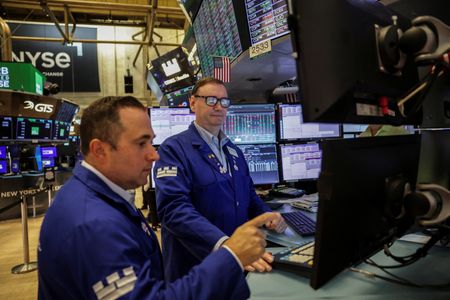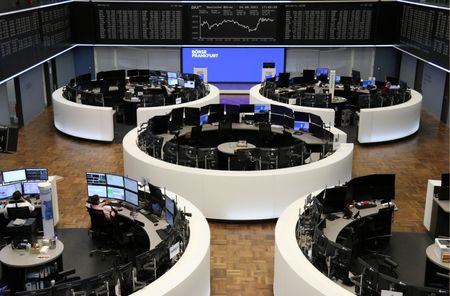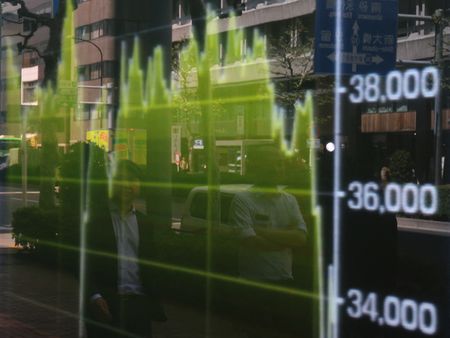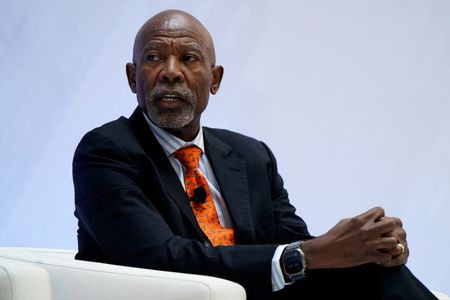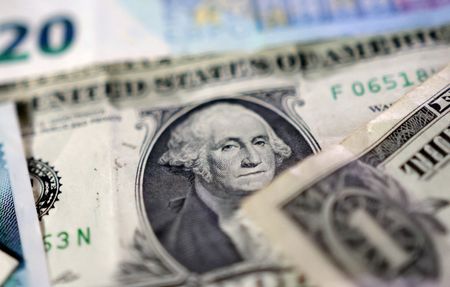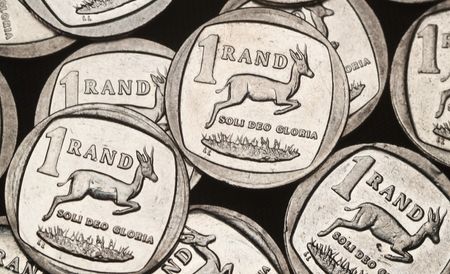By Sinéad Carew and Elizabeth Howcroft
NEW YORK/PARIS (Reuters) -Equity indexes advanced slightly on Wednesday while the dollar fell with U.S. bond yields, as markets calmed after U.S. President Donald Trump said he was “highly unlikely” to fire Federal Reserve Chair Jerome Powell.
Markets had turned volatile in late morning trading with stocks losing ground, the dollar selling off sharply, and gold prices spiking on fears Trump was seeking to remove the central bank chief. But investors reversed course after Trump contradicted a Bloomberg report that he was planning to oust Powell.
However, the president said he had spoken with some Republican lawmakers about the idea and unleashed fresh criticism against Powell while declining to completely reject the possibility of switching out the Fed chair, whose term is up in May 2026.
Powell has faced frequent public criticism from Trump as the central bank has kept interest rates steady while it monitors the inflationary impact from tariffs. The president has railed against Powell for not cutting rates sooner, prompting concern about whether the Fed’s independence could be eroded.
While the market would respond negatively to Powell’s ouster, Gene Goldman, chief investment officer at Cetera Investment Management, noted it would take some time to remove the policymaker, who has just one vote out of 12 on monetary policy changes. But he sees plenty more investor worries.
“The markets remain very jittery. We have high valuations, and it’s the beginning of earnings season with OK but not great bank earnings,” said Goldman. He also pointed to a bearish outlook from Dutch company ASML <ASML.AS> as clients of the world’s biggest supplier of computer chip-making equipment await clarity on U.S. tariffs before making big purchases.
“ASML’s cautious outlook is not a great indicator for the semiconductor industry. And inflation reports have not equivocally given any suggestion that the Fed should cut rates any time soon.”
Earlier on Wednesday, data showed U.S. producer prices were unexpectedly unchanged in June as an increase in the cost of goods due to tariffs on imports was offset by weakness in services. The unchanged reading in the producer price index for final demand last month followed an upwardly revised 0.3% rise in May. This was after Tuesday’s U.S. consumer price data for June pointed to higher costs for some goods.
“It’s very early innings when determining whether or not and to what extent tariffs are going to impact inflation,” said Don Calcagni, chief investment officer at Mercer Advisors.
While investors wait to see where the Trump administration ultimately sets tariff levels, Calcagni noted that inflation numbers are also being muddied by the depletion of goods in stock at companies that had built up higher-than-usual inventories in anticipation of the new import taxes.
On Wall Street, the Dow Jones Industrial Average finished up 231.49 points, or 0.53%, at 44,254.78 while the S&P 500 rose 19.94 points, or 0.32%, to 6,263.70 and the Nasdaq Composite rose 52.69 points, or 0.26%, to 20,730.49.
MSCI’s gauge of stocks across the globe rose 0.86 points, or 0.09%, to 921.11.
Earlier, the pan-European STOXX 600 index had closed down 0.57% with the chip sector dragging European equities lower.
In currencies, the U.S. dollar was lower but above its lows of the day after the immediate worries about Powell subsided.
The dollar index, which measures the greenback against a basket of currencies including the yen and the euro, fell 0.3% to 98.29.
The euro was up 0.34% at $1.1639 while against the Japanese yen, the dollar weakened 0.71% to 147.81.
“What can kill the value of the U.S. dollar, what can absolutely destroy faith in the U.S. dollar, is attacking in any way, shape, or form the independence and authority of the Federal Reserve,” said Juan Perez, senior director of trading at Monex USA in Washington.
Sterling strengthened 0.28% to $1.3416. Earlier data showed that Britain’s annual rate of consumer price inflation unexpectedly rose to its highest in over a year.
In Treasuries, the yield on benchmark U.S. 10-year notes fell 3.6 basis points to 4.453%, from 4.489% late on Tuesday while the 30-year bond yield fell 1 basis point to 5.0083%.
The 2-year note yield, which typically moves in step with interest rate expectations for the Federal Reserve, fell 6.7 basis points to 3.892%, from 3.959% late on Tuesday.
“This story keeps churning so understandably markets are nervous,” said Kenneth Broux, head of corporate research and rates, at Societe Generale in London referring to worries about Powell’s position.
“Bond and FX markets do not like the uncertainty. We’ve had stronger U.S. CPI goods ex-autos just yesterday, so to think that lower rates are the way forward as tariffs seep through consumer prices is not going to reassure.”
Oil prices edged lower on Wednesday as U.S. fuel inventory builds and concerns about wider economic impact from U.S. tariffs outweighed some signs of increasing demand.
U.S. crude settled down 0.21% at $66.38 a barrel while Brent futures fell to $68.52 per barrel, down 0.28%.
Gold prices trimmed gains on Wednesday after Trump denied he was planning to fire Powell.
Spot gold rose 0.78% to $3,348.20 an ounce after earlier rising as much as 1.6%.
(Reporting by Sinéad Carew, Karen Brettell, Gertrude Chavez-Dreyfuss in New York, Dhara Ranasinghe in London, Elizabeth Howcroft in Paris; Editing by Andrew Cawthorne, Mark Potter, Deepa Babington, Rod Nickel)

